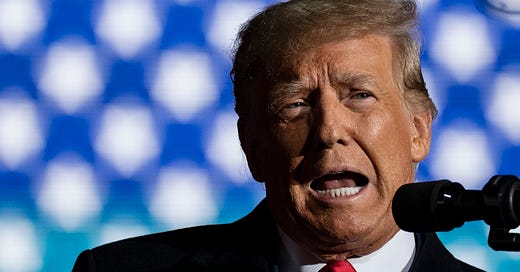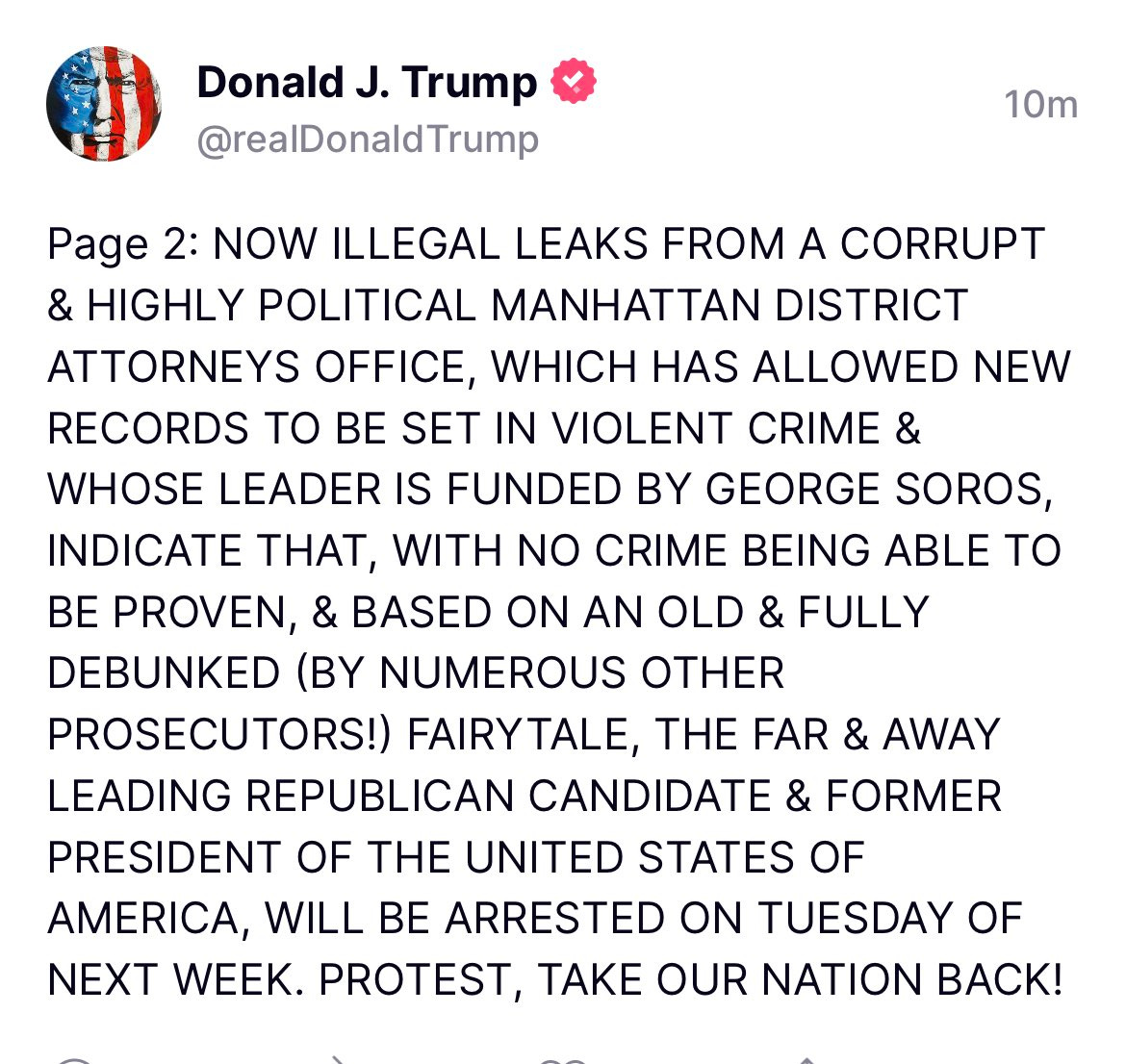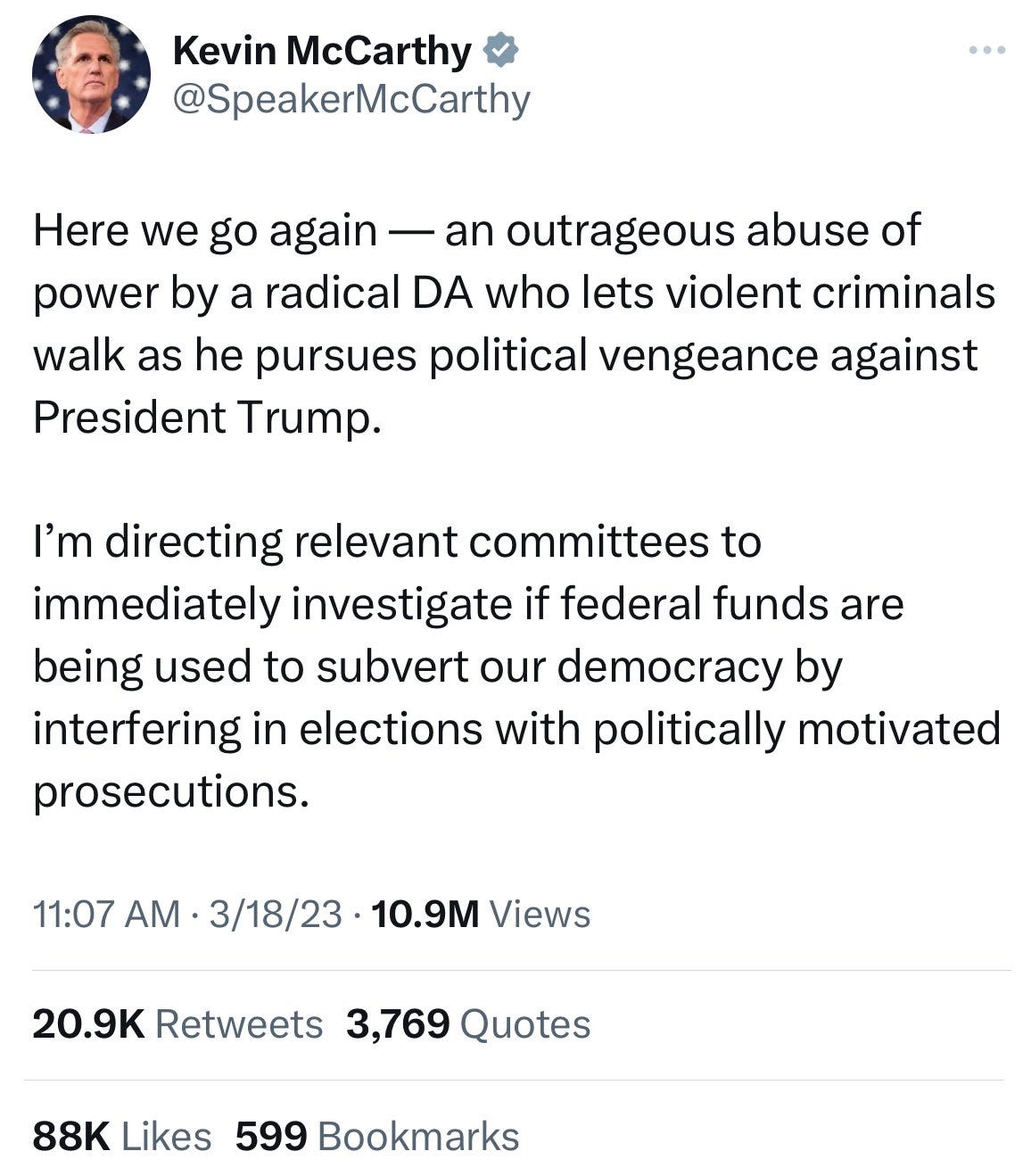The Worst is Yet to Come
Plus: Remembering what the Iraq War was like, 20 years later.
After an especially deranged weekend news cycle, let’s take inventory:
What we don’t know:
Whether Trump will actually be indicted.
What he will be charged with.
Whether he will be arrested, fingerprinted, or have a mugshot taken.
What we do know:
The former president is now actively channeling the rage and violence of January 6 against prosecutors, judges, and juries with a Trumpian mixture of menace and bullsh*t. Even though he actually had no information about a Tuesday arrest, he got the reaction from the base he hoped for. Stand back and standby redux.
We should be alarmed.
Trump has spent years now (1) delegitimizing the justice system, while (2) celebrating, embracing, and promising pardons to the violent seditionists of January 6.
Lest we forget, Trump called for the “termination” of the Constitution so he could be returned to power.
In the absence of legal consequences for the architects of the attack on the Capitol, and the tacit acceptance by the rest of the GOP, we should consider January 6 a dry run for what is to come. Tom Nichols writes in the Atlantic:
This morning, Donald Trump threatened to summon a mob—for the second time in two years—to his defense…. The last time he rallied his faithful supporters this way, they stormed the U.S. Capitol, which resulted in death and destruction and many, many prison sentences.
Trump himself today upped the ante by saying, in effect, that it doesn’t matter what’s in the indictment. Instead, he is warning all of us, point-blank, that he will violate the law if he wants to, and if you don’t like it, you can take it up with the mob that he can summon at will. This is pure authoritarianism, the flex of a would-be American caudillo who is betting that our fear of his goons is greater than our commitment to the rule of law. Once someone like Trump issues that kind of challenge, it doesn’t matter if the indictment is for murder, campaign-finance violations, or mopery with intent to gawk: The issue is whether our legal institutions can be bullied into paralysis.
“Manhattan DA Bragg privately warns of intimidation after Trump calls for protest.”
In an email to his office, Bragg wrote that “we do not tolerate attempts to intimidate our office or threaten the rule of law in New York.”
This morning, Trump escalated, appealing directly to the NYPD, suggesting that officers not protect prosecutors and other officials who he called “THE ‘DEFUNDERS’ & ‘COP HATERS’ OF THE RADICAL LEFT THAT WANT TO PUT THEIR GREATEST CHAMPION & FRIEND IN PRISON…”
The House GOP quickly made common cause, threatening the Manhattan DA with retribution. As part of the quid pro quo for making him speaker, Kevin McCarthy is making obstruction of justice a central plank of the GOP platform. (McCarthy’s half-hearted comment that people should not protest was more CYA than pushback of any kind.)
The normie GOP fell into line. Once again, reprising their role as the Hollow Men of American politics. Via Politico:
Donald Trump long predicted that his MAGA followers would rush to his defense if an indictment against him materialized. What became clear over the weekend was how quickly the rest of the Republican Party might follow.
After the former president broadcast his prediction that he would be arrested Tuesday and called for his base to protest, former Vice President Mike Pence said the case “reeks” of “political prosecution.” House Speaker Kevin McCarthy called it “an outrageous abuse of power by a radical DA.” Sen. Lindsey Graham (R-S.C.) said a Manhattan district attorney’s expected effort to bring a criminal charge over Trump’s handling of a hush money payment during his 2016 campaign was only evidence of how “afraid” Democrats are of the former president.
MAGA is already squeezing Ron DeSantis to come to Trump’s defense, and has already released the Flying Monkeys to harass the Florida governor. (Spoiler alert: DeSantis is going to cave.)
The Mad King in Exile has some more thoughts today:
Happy Monday.
A counterfactual
As I mentioned on Morning Joe, consider this counterfactual: Republicans could have said “Let’s see what the grand jury and the prosecutor decide.” Or: “We should let the justice system play out. Everyone should have their day in court. But we should have faith in the criminal justice system.” Or: “Maybe this is a good time to take the off-ramp, since this may be only the first of multiple criminal charges.”
Yeah, no. That didn’t happen.
Instead, both MAGA-friendly and anti-anti-Trump pundits used the threat of violence as a reason not to charge the former president. So we got lots of talk about backlash and why it should probably intimidate prosecutors in New York, Georgia, and the Department of Justice.



And we got this sort of flex:

The usual caveats
Let’s stipulate a few things:
It is unfortunate that this is the first case, because it will allow Trump and his supporters — at least initially — to frame the issue as a political hit job.
The NY charges relating to hush money payments to a porn star are the weakest case, concerning the least significant of Trump’s crimes, and may be based on “novel” legal theories. David French cautions that “although he is accused of making hush money payments, the legal theory that it could support a felony charge ‘has largely gone untested’ and ‘would therefore make for a risky legal case against any defendant.’ If that’s the case, then don’t file the charge.
Alvin Bragg will make an inviting target. His handling of the case has been inconsistent, and he brings a good deal of baggage to the spotlight. Expect Trump to attack and repeatedly play the race card.
At least in the short run, the indictment is likely to strengthen Trump in the GOP primary fight.
But…
This is a long story, and it is about to get longer. Far more serious charges are pending in Georgia and the DOJ. Make sure you read Kimberly Wehle in today’s Bulwark: “The Trump Investigation You Probably Haven’t Heard About.”
A savvy GOP would keep its powder dry.
This is not a savvy GOP.
The Most Important Thing You Will Read Today
Really.
“Moral Injuries: Remembering what the Iraq War was like, 20 years later.”
Will Selber is a lieutenant colonel in the United States Air Force, who served multiple tours of duty in Iraq and Afghanistan. (The views expressed here are his own and do not reflect the official policy or position of the Air Force or the Department of Defense.)
This a tough, tough read, so be warned. But it’s a story that has to be told.
Many veterans only give PG-13 stories when asked about their time downrange. We sanitize the truth for public consumption. After my first deployment in 2006, I met with friends over drinks. After a few too many, they asked me about my deployment and I told the truth. I told them about a dead, mutilated child we found on the road. Nobody spoke to me the rest of the night.
The lesson I took from that was that people generally don’t want to hear the truth about America’s wars. So I buried it.
But the only way to ensure a smooth transition for my comrades-in-arms is for us to be heard. Not just the stories of bravery, courage, and gallantry. But also the stories of shame, humiliation, and regret.
The discounts at stores are great. Boarding planes first is appreciated. But, after twenty years of war, many of us just want to share our stories with the people we fought for—without judgment and with your full, undivided attention.
So today, on the twentieth anniversary of the invasion of Iraq, resist the urge to dunk on your ideological opponents. Pause to reflect on the Iraqis who lost their lives. Remember our Gold Star families, whose grief is unimaginable. Pray for our service members still serving in Iraq.
Seek out an Iraq veteran and don’t just thank them for their service. Instead, ask them to share their stories.











Trump is a menace because of the GOP. Which is why I cannot see any circumstance under which I would cast a vote for any Republican in my lifetime. They fed this monster, and continue to do so.
One thing I've heard frequently is pundits saying the hush money case is a "weak case." This is false. I think they say "weak" when what they really mean is it's a minor crime relative to everything else Trump is guilty of. But this is not a weak case. Trump's co-conspirator was convicted and did hard time for this. And all these Republicans who foment unrest by framing this as a political prosecution didn't have a damned thing to say when Michael Cohen was convicted of it, because Cohen had turned against Trump and testified against him. These "normies" know this isn't about politics, it's about the rule of law, and they do not seem to mind that they're pouring gasoline on the fire. And these same people pray to God Trump will either drop dead or end up in jail before he becomes the party's nominee. Never Trump. Never DeSantis. Never Republican.
Will Selber's piece today is a stinging reminder of personal past experiences, but I'm glad more veterans of this conflict are speaking up about their experiences, because bottling this shit up is exactly why veteran suicide rates are so high. Like Will, my unit also lost one of our guys in the turret to a sniper when we stopped for an IED just three months after Will had lost his. The kid was 19, on his first deployment, and had never even got to drink a legal beer back home before losing his life.
The note that Will ends on, the stinging resentment of a whole generation of veterans who were immersed in this business while the rest of the country mostly checked out, is something I still feel deep down in my bones every day. I compare it to the folks who didn't wear masks throughout the first two years of the pandemic. Back in 2006, it felt like all of America wasn't wearing their masks while the guys like us were living in the hospital every day for a year at a time, exposed to the death and suffering while everyone else just kind of put it in the back of their minds. I came home to NYC in 2008--the literal "ground zero" for the global war on terror--only to find a depleted social circle, an economic recession, and very few job opportunities on hand for a 21-year-old without college.
The War on Terror was the first real war we mobilized for on the contract system, and the civ/mil divide I witnessed during and in the aftermath of combat is probably what has affected me the most, even beyond the things I saw in combat. It felt like all that survival was for nothing when you come home to nothing. I asked myself "why the hell did you bother to fight for your survival all that time if *this* is what you got to come back home to after all of that struggle?" I returned home to NYC at the age of 21 as a 3-time combat veteran, but it felt more like I was coming back home as an immigrant in my own country. I had no community to return to, no career prospects lined up, and very little direction in life. I'm lucky I made it to where I am today, but I saw a lot of other guys from my old units not make it out as well as I had, likely for the same reasons I struggled with. I can now unfortunately say that I've lost more platoon members to suicide than I did to combat. I worry for the next generation of volunteers who will find out what it's like to go to a prolonged war on the contract system. They're going to get recycled too, and probably to a conflict(S) with higher casualty rates.